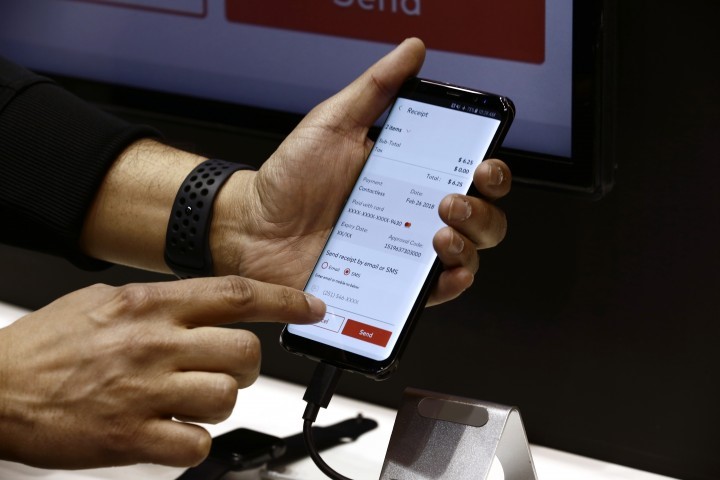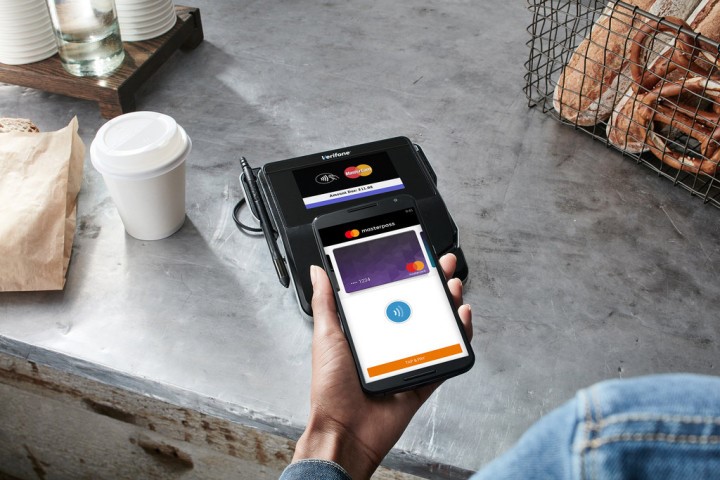Interview With Paloma Real, Managing Director of Mastercard Spain
A Telecommunications Engineer from the Polytechnic University of Madrid, Paloma Real has about 20 years of experience in the telecommunications and payments industry. She started her career with Mastercard in 2012 and in the last three years, before being appointed Managing Director in Spain in November 2017, she directed the Business Innovation and Development area of Mastercard Iberia.
Question: Can you describe the digitisation of the payments sector in Spain?
Answer: Currently, we are living in an authentic digital revolution in the financial sector, with a rapid emergence of new technologies along the entire value chain and in numerous business segments, such as payment methods. In this way, we have observed how technology and innovation are having a great impact on many aspects of people's daily lives; everyday actions like making payments have been completely transformed in recent years. Just five years ago it would have been very strange to pay for your purchase in an establishment by bringing a contactless card, a Smartphone or any wearable, to the dataphone, or authenticate that payment through a selfie. And yet, all these methods already exist: contactless payments are part of the daily transactions of many citizens, as well as biometric solutions, which will soon be available in Spain to increase the security of digital transactions.
Q.: How developed is this sector in Spain, as compared to other countries?
A.: In Spain, the development of new digital solutions is revolutionising the sector. According to the data we handle in Mastercard, in 2020, 38% of payments in Europe will be digital. In Spain we are currently at 30%, but it’s certainly an irreversible evolution that points to an obvious trend: we are heading to a future without cash, in which coins and bills will be replaced by more convenient payment methods, safer and faster than ever.
For this, the evolution of technology in payment methods has been crucial in recent years, and contactless technology has played a fundamental role in this revolution. In fact, according to our data, in Spain there are already more than one million contactless TPVs enabled in stores and spending through cards with this technology in 2017 increased by 153% in Spain with respect to the previous year.
In this sense, and as corroborated by the data collected in the Digital Payment Barometer of Mastercard 2017, one in three digital consumers pay with their mobile phone in physical stores thanks to the applications that banks make available to their customers to facilitate this type of transaction. This is a clear sign that digitisation in the payments sector has taken hold in Spain as a trend that, without a doubt, will draw a very interesting picture in the coming years.

Q.: The consumer evolves every day, is more aware of new trends in the sector and demands more from companies. Have you noticed any new needs or demands from your clients?
A.: This evolution of consumers has forced us to continually rethink our payment methods, in order to improve the user experience. We are aware that payment is not an end in itself, but a means to achieve something; as such, it should go as unnoticed as possible, so that the consumer can better enjoy their time and forget the transaction. For this, it must be perceived as something safe and reliable, something that’s inserted in products they use in their day to day — not only with mobile phones, but rings, bracelets, smartwatches, etc.
In this sense, security is a part of Mastercard's DNA. Over the last few years we have focused on developing this field. Today we already have tokenisation systems, which encrypt the personal data of each transaction in a unique code for a single use, or devices that authenticate payments through biometrics. This allows the user to make a transaction or access their financial services by taking a selfie or reading their fingerprint, or using Artificial Intelligence to control payment fraud.
On the other hand, payments are already present in the so-called wearables: devices that are part of the daily lives of users. In Spain, for example, this materialises in agreements such as the one reached with Fitbit Ionic, thanks to which we can help users perform everyday tasks using their watches, with the lowest possible number of steps or clicks. In the future, we will be able to integrate this with other portable devices.
In this sense, and according to our latest study of 11,915 digital banking users in 11 European countries including Spain, the convenience offered by digital payment systems is the advantage most valued by bank customers. Our report, which analysed innovation and digitalisation of payment solutions in the future of financial services, trade and daily transactions, also indicated that saving time is another key benefit for 76% of respondents nationwide. Ease of use was the third most important benefit, as highlighted by 69% of Spanish citizens.

Q.: When managing these needs and demands of clients, how does Mastercard approach the customer experience?
A.: At Mastercard, we always put the consumer at the center of all our innovations. Collecting data from these interactions is vital to improve processes and optimise our products in order to achieve greater user satisfaction. Our best guarantee is to offer a quality service, products that adapt to the new requirements of the market and customers, so defining a good strategy for managing their experience is vital for the company.
We are aware of the importance of developing our products to reach an increasingly informed and demanding customer, but we also know that once we have managed to connect with them, the future of the relationship will depend largely on the quality of their experience with Mastercard.
Q.: Following the previous question, how important is the implementation of a Digital Customer Experience strategy?
A.: As I said, providing a service that meets customer expectations is vital for our company in any segment of our business, especially as it relates to the digitalisation of payment processes.
In recent years, we have seen how the increase in digital payments and the convergence of new technologies in this sector have had a direct impact on Digital Customer Experience strategies, whether online or in store. At the end of the day, the issue is to anticipate the future demands of consumers and to always arrive on time, which is a clear part of the Mastercard business strategy.
In addition, contactless technology has made it possible to streamline the payment process through a simple “touch” on the POS (Point of Sale) terminal to complete a transaction.
The strategies of Digital Customer Experience materialise in these payment mechanisms which allow companies to meet the needs of consumers by eliminating the need to carry cash, stand in queues, carry a wallet or remember the passwords needed to make an online payment.

Q.: You started your Mastercard career in 2012, and in recent years you have directed the Business Innovation and Development area of Mastercard Iberia. How has the company evolved in these years, in terms of innovation and digital transformation?
A.: Before joining the team, specifically between 2009 and 2012, Mastercard made a series of acquisitions aimed at accelerating innovation in all areas of the company. As a technology company in the global payment business, we use technology, our experience and data-driven knowledge to make electronic payments more convenient, safe and efficient for people around the world.
The digital revolution has brought important advances in this field. At Mastercard, we have been a leading player in the implementation of technologies such as biometrics for the authentication of payments.
Also, for some years now, we have been working on the convergence of payments through the development of Artificial Intelligence, to make it possible for any device connected to the internet to be a convenient, simple and, above all, secure means of payment. In this line, wearables will make us forget uncomfortable coins and credit cards, because everything points to 2020 when 62% of wearables will be able to make payments.
In addition, we have been working for many years on financial inclusion projects that use technology to break down barriers and offer unlimited potential for economic growth, productivity and efficiency, which has already brought great benefit to millions of people around the world.
We believe that innovation can be used as a strategic and technological lever to develop responsible business management processes and global industry ecosystems, and will ensure that people develop confidence, self-esteem and the ability to propose creative ideas. In that sense, innovation is a tool for change, business transformation, administration, profitability and overall sustainability.

Q.: What do you think differentiates Mastercard from the rest of its competition in the payments sector in the new digital age?
A.: Mastercard has been leading the payments industry for fifty years. We work every day to continue writing the history of innovation in this area, pioneering new solutions in security and leading the way to a world without cash. Innovation, as I pointed out before, is part of everything we do. We continuously implement innovative processes, seeking new solutions to improve the lives of consumers around the world. For example, we recently introduced a system through which we use solar panels to bring light to areas without electricity or to create connected networks of mobile microtransactions for businesses, thus helping the international expansion of digital payment to areas it would not otherwise be feasible.
In addition, we are pioneers in projects that implement our knowledge — based on data, advanced technologies and our global network — to contribute to the construction of Smart Cities, which are more sustainable and more inclusive. We are currently helping many cities around the world to become more efficient by incorporating digital payments into their DNA, reducing dependence on cash and increasing their digital commitment. We can see examples of this evolution in capitals such as London or Madrid.
Specifically, in the Spanish capital, thanks to the agreement reached with the Madrid Municipal Transport Company (EMT), contactless payment is now allowed on all bus lines and a total of 2,100 validators have been installed. With this system — which is only an example of the projects that are being developed by the company — it has been possible to shorten travel time, since user access and ticket payment are faster. The costs related to the handling of cash and the issuance of specific cards to recharge money or transport tickets have also been eliminated.
Q.: What are the new challenges facing this sector?
A.: One of the main challenges that we have to face is getting companies to adapt as soon as possible to the digital world, since in the coming years it will be an essential condition and it’s better to be proactive in this field. This transformation will depend, to a large extent, on the willingness of the employees and executives of companies to adopt new digital forms of payment, and to recognise the importance and usefulness that innovation in this sector brings to their businesses. It’s also our task as a technology company to offer solutions that are as simple and useful as possible, so that this transition is easy and successful.
Q.: What would you highlight as a great success of the company? And in which other areas are you currently working to improve?
A.: Undoubtedly, the company has achieved very important objectives over the last few years, all of them focused on offering our customers the best experiences in the world of payments, with products and services that meet all security and simplicity requirements and that adapt to the habits of life.
In this sense, Artificial Intelligence features in a lot of the services we currently offer from the company. For example, in April 2017 we launched ‘Decision Intelligence’ globally, a comprehensive decision-making and fraud detection service. The solution uses artificial intelligence as a technology to help financial institutions increase the accuracy of authorisation of real transactions in real time and thus reduce false rejections.
If you enjoyed this interview with Paloma Real and are interested in innovative projects like those being carried out by Mastercard, you can listen to other technological professionals discuss digital transformation trends at The Inbounder Global Conference 2018. It’s the must-attend digital marketing event in Europe, which will take place on April, 25–26, at Palacio Municipal de Congresos in Madrid. Don’t miss it!
Subscribe to our newsletter and stay up to date with the latest digital trends.
Subscribe to our newsletter and stay up to date with the latest digital trends.
No thanks. My inbox is fine as it is.